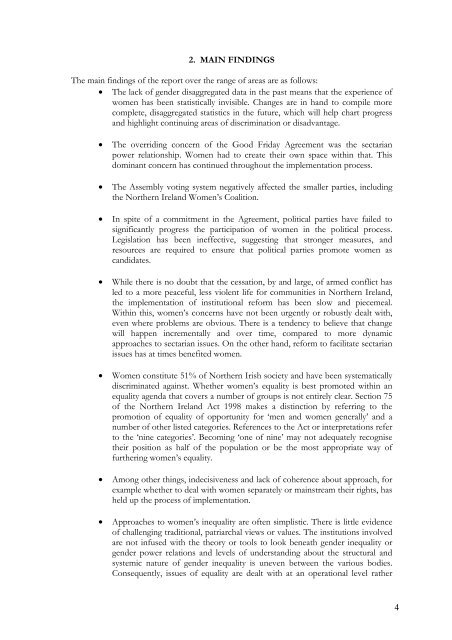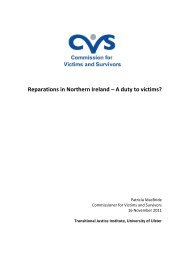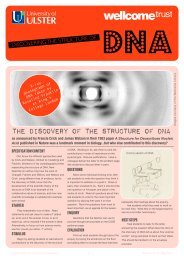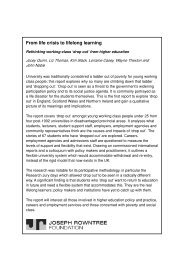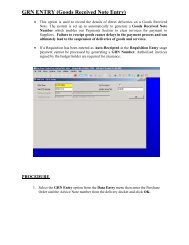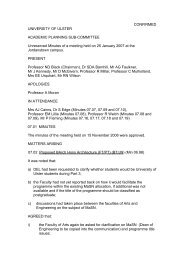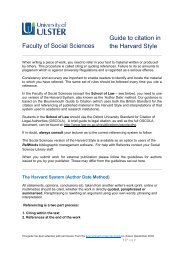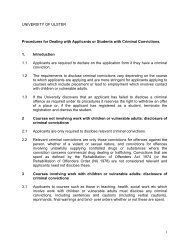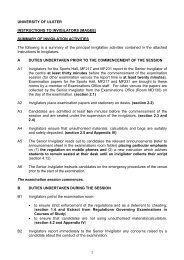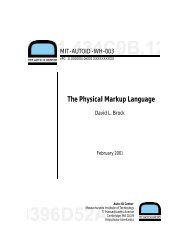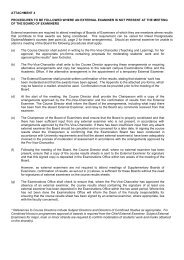Agreement Reached in the Multi-Party Negotiations - Transitional ...
Agreement Reached in the Multi-Party Negotiations - Transitional ...
Agreement Reached in the Multi-Party Negotiations - Transitional ...
You also want an ePaper? Increase the reach of your titles
YUMPU automatically turns print PDFs into web optimized ePapers that Google loves.
2. MAIN FINDINGS<br />
The ma<strong>in</strong> f<strong>in</strong>d<strong>in</strong>gs of <strong>the</strong> report over <strong>the</strong> range of areas are as follows:<br />
• The lack of gender disaggregated data <strong>in</strong> <strong>the</strong> past means that <strong>the</strong> experience of<br />
women has been statistically <strong>in</strong>visible. Changes are <strong>in</strong> hand to compile more<br />
complete, disaggregated statistics <strong>in</strong> <strong>the</strong> future, which will help chart progress<br />
and highlight cont<strong>in</strong>u<strong>in</strong>g areas of discrim<strong>in</strong>ation or disadvantage.<br />
• The overrid<strong>in</strong>g concern of <strong>the</strong> Good Friday <strong>Agreement</strong> was <strong>the</strong> sectarian<br />
power relationship. Women had to create <strong>the</strong>ir own space with<strong>in</strong> that. This<br />
dom<strong>in</strong>ant concern has cont<strong>in</strong>ued throughout <strong>the</strong> implementation process.<br />
• The Assembly vot<strong>in</strong>g system negatively affected <strong>the</strong> smaller parties, <strong>in</strong>clud<strong>in</strong>g<br />
<strong>the</strong> Nor<strong>the</strong>rn Ireland Women’s Coalition.<br />
• In spite of a commitment <strong>in</strong> <strong>the</strong> <strong>Agreement</strong>, political parties have failed to<br />
significantly progress <strong>the</strong> participation of women <strong>in</strong> <strong>the</strong> political process.<br />
Legislation has been <strong>in</strong>effective, suggest<strong>in</strong>g that stronger measures, and<br />
resources are required to ensure that political parties promote women as<br />
candidates.<br />
• While <strong>the</strong>re is no doubt that <strong>the</strong> cessation, by and large, of armed conflict has<br />
led to a more peaceful, less violent life for communities <strong>in</strong> Nor<strong>the</strong>rn Ireland,<br />
<strong>the</strong> implementation of <strong>in</strong>stitutional reform has been slow and piecemeal.<br />
With<strong>in</strong> this, women’s concerns have not been urgently or robustly dealt with,<br />
even where problems are obvious. There is a tendency to believe that change<br />
will happen <strong>in</strong>crementally and over time, compared to more dynamic<br />
approaches to sectarian issues. On <strong>the</strong> o<strong>the</strong>r hand, reform to facilitate sectarian<br />
issues has at times benefited women.<br />
• Women constitute 51% of Nor<strong>the</strong>rn Irish society and have been systematically<br />
discrim<strong>in</strong>ated aga<strong>in</strong>st. Whe<strong>the</strong>r women’s equality is best promoted with<strong>in</strong> an<br />
equality agenda that covers a number of groups is not entirely clear. Section 75<br />
of <strong>the</strong> Nor<strong>the</strong>rn Ireland Act 1998 makes a dist<strong>in</strong>ction by referr<strong>in</strong>g to <strong>the</strong><br />
promotion of equality of opportunity for ‘men and women generally’ and a<br />
number of o<strong>the</strong>r listed categories. References to <strong>the</strong> Act or <strong>in</strong>terpretations refer<br />
to <strong>the</strong> ‘n<strong>in</strong>e categories’. Becom<strong>in</strong>g ‘one of n<strong>in</strong>e’ may not adequately recognise<br />
<strong>the</strong>ir position as half of <strong>the</strong> population or be <strong>the</strong> most appropriate way of<br />
fur<strong>the</strong>r<strong>in</strong>g women’s equality.<br />
• Among o<strong>the</strong>r th<strong>in</strong>gs, <strong>in</strong>decisiveness and lack of coherence about approach, for<br />
example whe<strong>the</strong>r to deal with women separately or ma<strong>in</strong>stream <strong>the</strong>ir rights, has<br />
held up <strong>the</strong> process of implementation.<br />
• Approaches to women’s <strong>in</strong>equality are often simplistic. There is little evidence<br />
of challeng<strong>in</strong>g traditional, patriarchal views or values. The <strong>in</strong>stitutions <strong>in</strong>volved<br />
are not <strong>in</strong>fused with <strong>the</strong> <strong>the</strong>ory or tools to look beneath gender <strong>in</strong>equality or<br />
gender power relations and levels of understand<strong>in</strong>g about <strong>the</strong> structural and<br />
systemic nature of gender <strong>in</strong>equality is uneven between <strong>the</strong> various bodies.<br />
Consequently, issues of equality are dealt with at an operational level ra<strong>the</strong>r<br />
4


